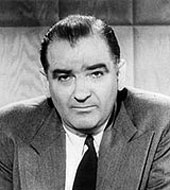Department History
- Foundations of Foreign Affairs, 1775-1823
- The Expansionist Years, 1823-1867
- Rise to World Power, 1867-1913
- The Challenge of Global Conflict, 1913-1945
- Containment and Cold War, 1945-1961
- The World in 1945
- George Kennan and Containment
- The Truman Doctrine and the Marshall Plan
- Containment and Collective Defense
- A Changing Role for the Secretary
- A New National Security Structure
- NSC-68 and the Korean War
- Foreign Policy under President Eisenhower
- McCarthyism Hits the Department
- "Wristonization"
- New Secretary; New Quarters
- Conclusion
- Superpowers Collide, 1961-1981
- The End of the Cold War, 1981-1992
A Short History of the Department of State
McCarthyism Hits the Department
The Cold War years were troubling ones for the Foreign Service, after it became the prime target of Senator Joseph McCarthy's search for pro-Communist subversives in the U.S. Government.

Senator Joseph McCarthy
In February 1950, shortly after the Soviet Union developed its own nuclear weapons and Mao Zedong’s communist forces seized power in China, the Wisconsin Senator launched his anti-communist crusade with a speech in Wheeling, West Virginia. Describing the international position of the United States in the most dire terms, he insisted: “How can we account for our present situation unless we believe that men high in the government are concerting to deliver us to disaster? This must be the product of a great conspiracy on a scale so immense as to dwarf any previous venture in the history of man.”
He announced that he had a list of 205 subversives—“a list of names that were made known to the Secretary of State as being members of the Communist Party and who nevertheless are still working and shaping policy in the State Department.” Senator McCarthy never made that list public or proved any of his allegations. A number of the most experienced Foreign Service officers—notably the Department’s corps of Far Eastern experts, the so-called “China hands,” including Oliver Edmund Clubb, John Patton Davies, John Stewart Service, and John Carter Vincent—were forced out of the Department or suffered serious damage to their reputations.
McCarthy's allegations had a lasting effect on those who remained in the Department. John W. Ford, a security officer at the time, has since noted, “few people who lived through the McCarthy era in the Department of State can ever forget the fear, intimidation, and sense of outrage which permeated Foggy Bottom.” In 1978, the Under Secretary of State for Political Affairs, David D. Newsom, said: “I can recall the shock of the taunts and suspicions leveled at the State Department and those who served in it. It must be satisfying, but not full recompense, for those who suffered in that period to have our nation now realize that they were substantially right.”
The mistaken notion that the Department of State somehow served the nation’s enemies lingered on for some years. One former Department of State employee, Epers , was found guilty of passing secrets to the Soviets in the late 1930s, but this exception did not detract from the fact that the criticism by McCarthy and others of like mind was unjustified.

Alger Hiss
The Foreign Service and Department of State were convenient targets for “Red baiting” because they were without a domestic constituency. The absence of powerful and assertive support from organized interest groups, especially in comparison with most other major agencies, made the Department vulnerable to McCarthy’s irresponsible charges and allowed him to attack it without fear of serious retaliation. Personally, Secretary Dulles and President Eisenhower may have deplored McCarthy’s attacks, but they did little to combat McCarthy. Only when the Senator took on the U.S. Army did he meet real resistance and lose his influence and power.
